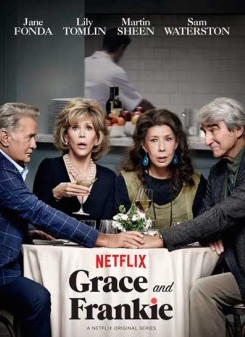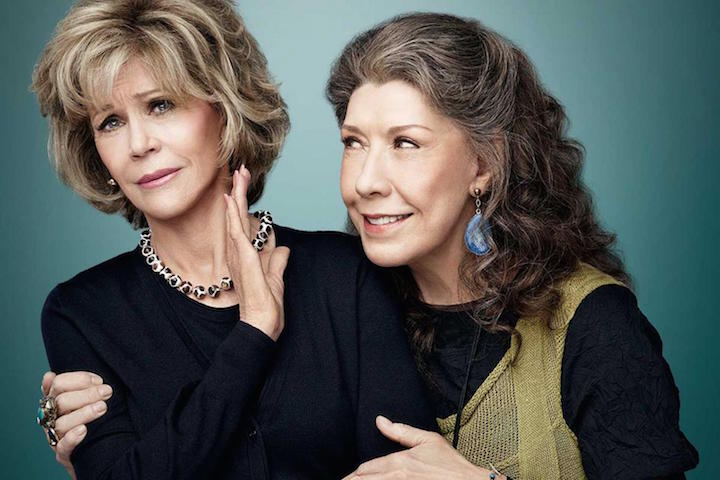 Grace and Frankie
Grace and Frankie
Created by Marta Kauffman
and Howard J. Morris
Netflix Original Series
CALL IT the Bruce Jenner effect. Television viewers of late have become absolutely enthralled by the idea of the all-American man who up and leaves his wife and children for another man, or, in Jenner’s more unusual case, leaves a man’s body for a female one. Earlier this year, in a much-anticipated interview with Diane Sawyer, the former Olympian and reality TV star opened up about his lifelong gender identity crisis, his three marriages, and his decision, at age 65, to pursue sexual reassignment surgery. Nearly seventeen million people tuned in to hear Jenner’s confession, which ABC wisely used as a teaching tool, interweaving the Q&A, in which Sawyer often looked dumbfounded, with experts in the field of human sexuality and testimonials by other transgender people.
Beneath the hype, however, is the startling degree to which mainstream America is waking up to the fact that many social roles—that of the sports hero, the family man, the macho man—are often deceptive surfaces. An increasingly critical and modern understanding of identity and its discontents appears to be taking hold. The closest parallel to Jenner’s experience is Transparent, the comedy-drama (from Amazon Studios) for which Jeffrey Sambor was awarded the Golden Globe. There’s also the latest season of HBO’s Girls, which explored the idea of having a gay dad through the lens of his unsuspecting wife and daughter. Girls scoured the situation for crude humor, but it also revealed a range of reactions: Tad’s euphoria when he came out, his wife Loreen’s rage and sexual self-doubt, and the cautious acceptance offered by his daughter Hannah, who was always an ardent supporter of gays and lesbians until they suddenly bloomed above her in the family tree.

Another new series, Netflix’ Grace and Frankie, charts the same fallout from the perspective of a gay man’s wife—make that two wives—whose husbands have left them for each other. Veteran stars Jane Fonda and Lily Tomlin are Grace and Frankie, with Robert and Sol played by the silver-haired septuagenarians Martin Sheen and Sam Waterson. If you were surprised to see Bruce Jenner—who was the first athlete to appear on the Wheaties box—sporting a ponytail and nail polish, get ready for another paragon of American masculinity, Sheen—aka Captain Willard in Apocalypse Now and President Bartlet on The West Wing—calling Waterson “sweetheart” and joking about his crush on Ryan Gosling. As for the show’s titular wives, it has been 35 years since Fonda and Tomlin (also the show’s executive producers) teamed up in 9 to 5 to skewer their horrible boss, but their knives drawn and their odd couple antics are every bit as edgy in Grace and Frankie.
The show’s pilot is probably its weakest episode and it put me off for two reasons. First, I’m not a little tired of seeing straight men play gay for laughs; and second, the restaurant scene in which Robert and Sol break it to their spouses that they’re lovers felt contrived, even gimmicky. While their husbands are law partners, Grace and Frankie are not really friends when they gather to hear what they expect will be the men’s plan to retire. Two-time Oscar winner Fonda can play the grande dame with a blindfold on, and upon meeting Tomlin at the table, she sends back the bread but orders a martini in its place. When Frankie informs her that vodka is made from potatoes and no less caloric, Fonda shoots backs: “Alcohol has its own rules.” From there, the men make their announcement, Fonda starts a food fight, and Tomlin has an asthma attack. It all feels forced and unfunny. The one remark that really resonates is when Grace, in her vanity mirror, tells Robert: “It would have been easier if you’d died.” Hell hath no fury like a beard scorned.
It’s fitting that “The Funeral,” the fourth episode in the thirteen-part series, lends the show some much-needed depth. Here the characters face the painful repercussions of the men’s revelation after forty years of matrimony. Realizing that coming out is not just a moment in time but a process, Robert sighs, “I’ll never not be coming out.” Waterson plays Sol as slightly daffy: worried about nomenclature, he explains to friends that he and Robert are more than just associates but “homosexual law and bed partners … with each other … in life.” Hiding in the kitchen, Frankie snacks while Grace flaunts her figure and wonders aloud whether she was in denial all those years. “God, I was inside it and I didn’t see,” says Fonda, half astonished and half disgusted with herself. “Was I that self-involved?” Alas, there’s a tinge of melancholy latent in the laughter, and with that Grace and Frankie, a show about grace under pressure but also realizing one’s erotic potential (even late in life), finally feels frank.
Colin Carman, PhD, teaches British and American literature at Colorado Mesa University and has written for this magazine since 2008.





